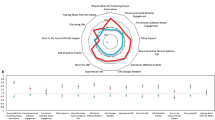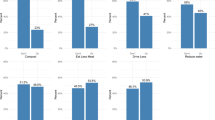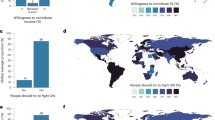Abstract
Personal and political action on climate change is traditionally thought to be motivated by people accepting its reality and importance. However, convincing the public that climate change is real faces powerful ideological obstacles1,2,3,4, and climate change is slipping in public importance in many countries5,6. Here we investigate a different approach, identifying whether potential co-benefits of addressing climate change7 could motivate pro-environmental behaviour around the world for both those convinced and unconvinced that climate change is real. We describe an integrated framework for assessing beliefs about co-benefits8, distinguishing social conditions (for example, economic development, reduced pollution or disease) and community character (for example, benevolence, competence). Data from all inhabited continents (24 countries; 6,196 participants) showed that two co-benefit types, Development (economic and scientific advancement) and Benevolence (a more moral and caring community), motivated public, private and financial actions to address climate change to a similar degree as believing climate change is important. Critically, relationships were similar for both convinced and unconvinced participants, showing that co-benefits can motivate action across ideological divides. These relationships were also independent of perceived climate change importance, and could not be explained by political ideology, age, or gender. Communicating co-benefits could motivate action on climate change where traditional approaches have stalled.
This is a preview of subscription content, access via your institution
Access options
Subscribe to this journal
Receive 12 print issues and online access
$209.00 per year
only $17.42 per issue
Buy this article
- Purchase on Springer Link
- Instant access to full article PDF
Prices may be subject to local taxes which are calculated during checkout


Similar content being viewed by others
Change history
18 March 2016
In the version of this Letter originally published, the following affiliation was missing for Paul G. Bain: Institute for Health and Biomedical Innovation, Queensland University of Technology, Brisbane, Australia. This has now been corrected in the online version of the Letter.
References
Bliuc, A.-M. et al. Public division about climate change rooted in conflicting socio-political identities. Nature Clim. Change 5, 226–229 (2015).
Hoffman, A. J. The growing climate divide. Nature Clim. Change 1, 195–196 (2011).
McCright, A. M. & Dunlap, R. E. Cool dudes: The denial of climate change among conservative white males in the United States. Glob. Environ. Change 21, 1163–1172 (2011).
McCright, A. M. & Dunlap, R. E. The politicization of climate change and polarization in the American public’s views of global warming, 2001–2010. Sociol. Q. 52, 155–194 (2011).
Pew Research Center Thirteen Years of the Public’s Top Priorities (2014); http://www.people-press.org/interactive/top-priorities
United Nations Development Group A Million Voices: The World We Want (2013); http://www.worldwewant2015.org/millionvoices
Moser, S. C. & Dilling, L. in Creating a Climate for Change: Communicating Climate Change and Facilitating Social Change (eds Moser, S. C. & Dilling, L.) 491–516 Ch. 32, (Cambridge Univ. Press, 2007).
Bain, P. G., Hornsey, M. J., Bongiorno, R., Kashima, Y. & Crimston, D. Collective futures: How projections about the future of society are related to actions and attitudes supporting social change. Pers. Soc. Psychol. Bull. 39, 523–539 (2013).
Bowman, T. E. et al. Time to take action on climate communication. Science 330, 1044 (2010).
Whitmarsh, L. Scepticism and uncertainty about climate change: Dimensions, determinants and change over time. Glob. Environ. Change 21, 690–700 (2011).
Nemet, G. F., Holloway, T. & Meier, P. Implications of incorporating air-quality co-benefits into climate change policymaking. Environ. Res. Lett. 5, 014007 (2010).
West, J. J. et al. Co-benefits of mitigating global greenhouse gas emissions for future air quality and human health. Nature Clim. Change 3, 885–889 (2013).
UNEP Towards a Green Economy: Pathways to Sustainable Development and Poverty Eradication—A Synthesis for Policy Makers (2011); http://www.unep.org/greeneconomy
Fabian, N. Economics: Support low-carbon investment. Nature 519, 27–29 (2015).
Thurston, G. D. Mitigation policy: Health co-benefits. Nature Clim. Change 3, 863–864 (2013).
Maibach, E. W., Nisbet, M., Baldwin, P., Akerlof, K. & Diao, G. Reframing climate change as a public health issue: An exploratory study of public reactions. BMC Public Health 10, 299 (2010); http://www.biomedcentral.com/1471-2458/10/299
Bain, P. G., Hornsey, M. J., Bongiorno, R. & Jeffries, C. Promoting pro-environmental action in climate change deniers. Nature Clim. Change 2, 600–603 (2012).
Lee, T. M., Markowitz, E. M., Howe, P. D., Ko, C.-Y. & Leiserowitz, A. A. Predictors of public climate change awareness and risk perception around the world. Nature Clim. Change http://dx.doi.org/10.1038/nclimate2728 (2015).
Fiske, S. T., Cuddy, A. J. C. & Glick, P. Universal dimensions of social cognition: Warmth and competence. Trends Cogn. Sci. 11, 77–83 (2006).
Leach, C. W., Ellemers, N. & Barreto, M. Group virtue: The importance of morality (vs. competence and sociability) in the positive evaluation of in-groups. J. Pers. Soc. Psychol. 93, 234–249 (2007).
Stern, P. C. Toward a coherent theory of environmentally significant behavior. J. Soc. Issues 56, 407–424 (2000).
Lipsey, M. W. & Wilson, D. B. Practical Meta-Analysis (Sage Publications, 2000).
Hunter, L. M., Hatch, A. & Johnson, A. Cross-national gender variation in environmental behaviors. Soc. Sci. Q. 85, 677–694 (2004).
Hsu, A. et al. The 2014 Environmental Performance Index (Yale Center for Environmental Law and Policy, 2014).
Franzen, A. & Meyer, R. Environmental attitudes in cross-national perspective: A multilevel analysis of the ISSP 1993 and 2000. Eur. Sociol. Rev. 26, 219–234 (2010).
Freymeyer, R. H. & Johnson, B. E. A cross-cultural investigation of factors influencing environmental actions. Sociol. Spectr. 30, 184–195 (2010).
Spence, A., Poortinga, W., Butler, C. & Pidgeon, N. F. Perceptions of climate change and willingness to save energy related to flood experience. Nature Clim. Change 1, 46–49 (2011).
Broomell, S. B., Budescu, D. V. & Por, H.-H. Personal experience with climate change predicts intentions to act. Glob. Environ. Change 32, 67–73 (2015).
Gromet, D. M., Kunreuther, H. & Larrick, R. P. Political ideology affects energy-efficiency attitudes and choices. Proc. Natl Acad. Sci. USA 110, 9314–9319 (2013).
Hackmann, H., Moser, S. C. & St Clair, A. L. The social heart of global environmental change. Nature Clim. Change 4, 653–655 (2014).
Schwartz, S. H. in Advances in Experimental Social Psychology Vol. 25 (ed. Zanna, M. P.) 1–65 (Academic Press, 1992).
Stern, P. C., Dietz, T., Abel, T., Guagnano, G. A. & Kalof, L. A value-belief-norm theory of support for social movements: The case of environmentalism. Hum. Ecol. Rev. 6, 81–97 (1999).
McDonald, R. I., Fielding, K. S. & Louis, W. R. Energizing and de-motivating effects of norm conflict. Pers. Soc. Psychol. Bull. 39, 57–72 (2012).
Whitmarsh, L. & O’Neill, S. Green identity, green living? The role of pro-environmental self-identity in determining consistency across diverse pro-environmental behaviours. J. Environ. Psychol. 30, 305–314 (2010).
Schwartz, S. et al. Basic personal values underlie and give coherence to political values: A cross national study in 15 countries. Polit. Behav. 36, 899–930 (2014).
Acknowledgements
This research was supported by the following grants or financial support: Australian Research Council Discovery Project grants to P.G.B. (DP0984678) and to Y.K. (DP130102229); Marsden Fast-Start grant (E1908) from The Royal Society of New Zealand to T.L.M.; MNISW Iuventus Plus Grant IP2014 002273 to M.B.; the Center for Social Conflict and Cohesion Studies (COES), FONDAP Na15130009 to R.G.; and the Government of the Russian Federation within the framework of the implementation of the 5-100 Programme Roadmap of the National Research University Higher School of Economics to N.L. Acknowledgement of non-author contributions is in Supplementary Section 5.
Author information
Authors and Affiliations
Contributions
P.G.B., T.L.M., and Y.K. designed and coordinated the research project and collected data, with input into design and measures from all authors. P.G.B. analysed the data and wrote the paper, in conjunction with T.L.M. and Y.K. and with input from all authors. M.B., G.D., R.B.G., V.V.G., Y.G., L.-O.J., C.P., V.C.-V., J.I.A., A.U., C.D., S.O., J.P., M.S., L.S., R.G., N.L., O.J.M., C.W., G.E. and N.M.S. also translated materials, collected data and contributed to the manuscript. C.S.A., T.K., J.L.S. and P.W.S. also collected data and contributed to the manuscript.
Corresponding author
Ethics declarations
Competing interests
The authors declare no competing financial interests.
Supplementary information
Rights and permissions
About this article
Cite this article
Bain, P., Milfont, T., Kashima, Y. et al. Co-benefits of addressing climate change can motivate action around the world. Nature Clim Change 6, 154–157 (2016). https://doi.org/10.1038/nclimate2814
Received:
Accepted:
Published:
Issue Date:
DOI: https://doi.org/10.1038/nclimate2814
This article is cited by
-
The synergistic reduction effect of PM2.5 and CO2: evidence from national key ecological functional areas in China
Environmental Science and Pollution Research (2024)
-
Directing personal sustainability science toward subjective experience: conceptual, methodological, and normative cornerstones for a first-person inquiry into inner worlds
Sustainability Science (2024)
-
Climate change beliefs and their correlates in Latin America
Nature Communications (2023)
-
Making embodied carbon mainstream: a framework for cities to leverage waste, equity, and preservation policy to reduce embodied emissions in buildings
Journal of Environmental Studies and Sciences (2023)
-
The impact of silicon on the solidification of duplex lightweight steels
Journal of Thermal Analysis and Calorimetry (2023)



